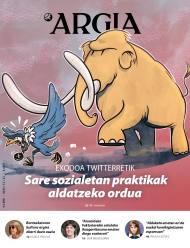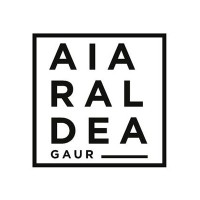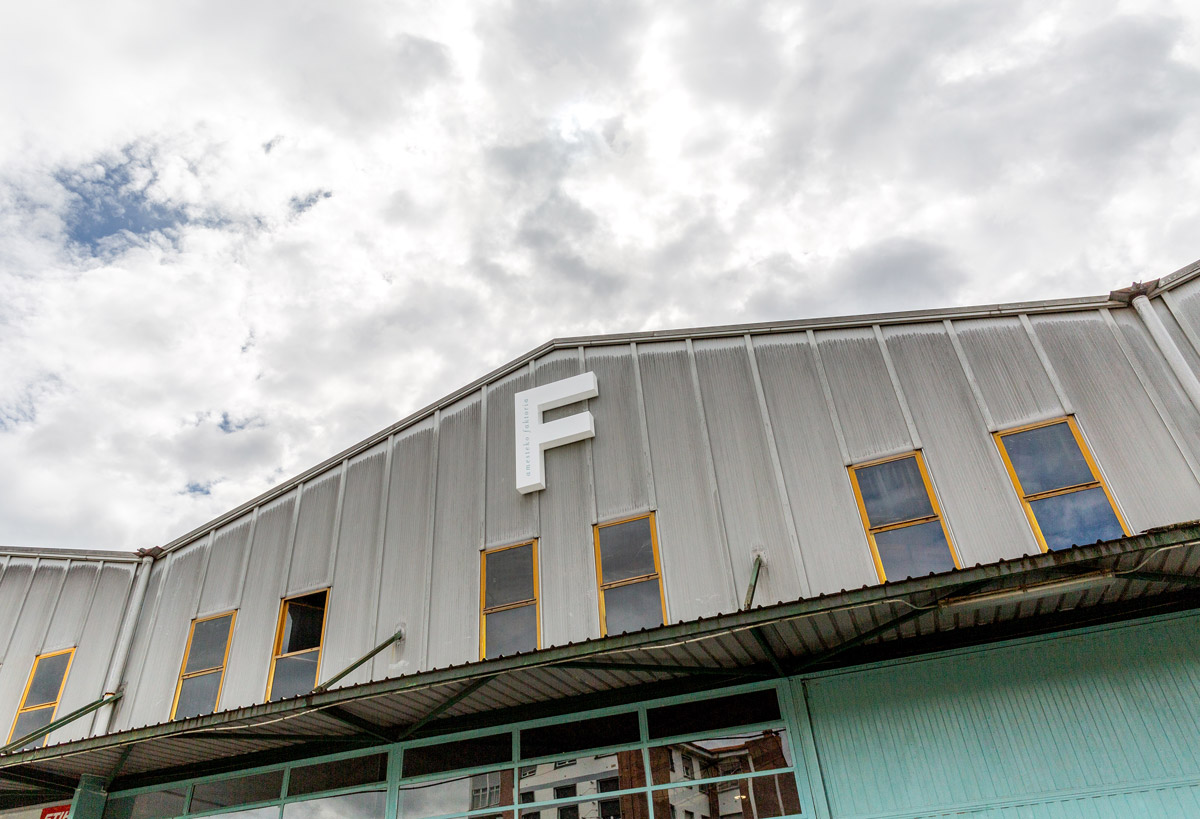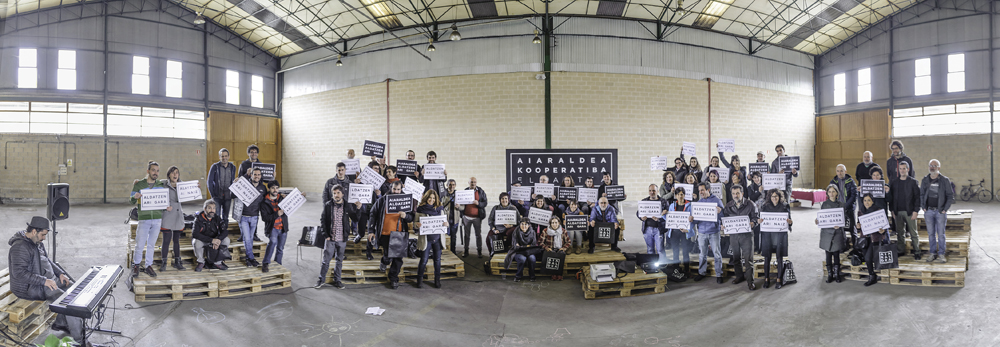"Living I in Basque does not mean closing the doors to other languages and cultures"
- First the Aiaraldea Media was founded and then Faktoria. They are based in Laudio, where Izar Mendiguren works. Journalist, bertsolari, musician, militant... The ruling states that two seats cannot be covered with a rear seat, but Mendiguren’s capacity is greater.

Izar Mendiguren Cosgaya (Llodio 1988)
He studied journalism, and it's been written in the Berria newspaper and in this same ARGIA. Bertsolari has won several times the Bertsolaris Championship in Álava, which was held in Vitoria-Gasteiz. The musician was the voice and guitar of the Uluka group, now by Bubble... It has been owned since its inception by the Aiaraldea Cooperative Society and the Aiaraldea Activity Branch. Agent Suharra works from both feminism and Euskera, engaging in all kinds of projects. Fortunately, he knows how to stop himself, the best fruit is ripening within Izar Mendiguren.
She works at the Cultural Branch of
Aiaraldea...To influence the promotion of Euskera, we first created the Communication Window Aiaraldea, the current media. Afterwards, we created the Faktoria space, in addition to communication projects to strengthen the use of the Basque Country, understanding that we needed community projects. So in addition to communication, we started working on feminism, food sovereignty, education, culture and transformative social economy, among others.
The Factory is 2021...
Space Faktoria yes. And since then we are offering a setting for creators, organizing creative stays, helping newly arrived and empowered women, developing pedagogical guides, school or “Family Nest” and colonies, weaving networks and making visible local producers and those who work in agroecology, promoting an economy based on other values with energy plates... We are working on countless tasks, but always in the articulation, network and transformation of the community of the euskera.El name of the City of
Amurrio is dirty lately, after several steps on the road to normalization of the Basque: Basque technician, reduction of linguistic profiles in the sports company, attitude towards the Aiaraldea factory...
He has not recognised the work of this medium in Basque, with a subsidy of EUR 6,000. According to our reading, the media in Basque are absolutely strategic, especially in this digital age, so linguistic policies should support this type of project. We're a not-for-profit project, which society wins, and Euskera, because we put voice, image and sound to the new ones on all sides.
In 2013 we met Josune Irabien in ARGIA as Mayor of Amurrio. She is currently Director of Promotion of the Basque Government of the Basque Country. In Amurrio, the Basque Country is going backwards.
We ask for your mediation...
Campo Castellano, Llodio.
Yes. Great knowledge, among children under one age, but very little use. I, however, in favour of hope, will say that the creation of projects such as Faktoria or Aiaraldea Komunikazioa Komunikabideak has led to small transformations and growth, at least in our own spaces and products, has taken place.
In 2021 you opened this Aiaraldea Factory...
With the objective of becoming the center of inspiration of the Basque Country. To those who come here, we ask for this, commitment to the Basque Country, to take steps, to collectivize responsibility, to feed the new individuals, to help materialize our project and enhance the transformation. Life is changing, so is society, as seen in education, in life, in food, in culture... And there's our challenge, that is, to adapt our projects and spaces to new times, shapes, needs, bodies or identities.
The Kafe Antzokia of Bilbao, the Laba of Pamplona, the Izaskun Arrue Cultural Centre of Vitoria-Gasteiz, San Agustín de Azpeitia.. are in the centre of urban villages, unlike this Fakoria, which is located in the industrial estate of Llodio.
Ha ha ha! Because it's the dream factory! Our motto is the factory to live and dream. Our project is not only from Laudio, but from the region: it encompasses nine municipalities, from Orduña to Orozko, Arrankudiaga, Zollo and Artziniega... because that is our social sphere of life. This identity of Aiaraldea, for example, did not exist before 2009, that is, until the year in which we created the Aiaraldea Komunikazio Leihoa partnership and created a means of communication in networking. La Cuadrilla de Ayala belongs to Álava, while the municipalities of Orozko, Arrankudiaga, Zollo and Arakaldo are those of Bizkaia. But our social region is Aiaraldea. This is also significant, as this project has succeeded in cohesion and gear. I would not have guessed it in other respects, but at least in that.
Industrial Estate of Llodio.
We traveled the region through the different spaces, in the surroundings of Amurrio and Llodio, above all because they are the towns with the largest population mass. At Laudio, we got the opportunity to buy this pavilion, and we moved on. It is located in the industrial estate, but a 10-minute walk from the center. It has a train station two minutes away and, next to it, the River Nervión, a place of departure and return, both for walking and for sports. It's not in the urban core, it's true, and maybe that's also a psychological limit, for some to make an effort to get here. But it's not an impediment. And it also has a good side: more space to organize things.
What work do you do at the Aiaraldea Factory?
In this house we all do everything! I've been a journalist scholar, and from the beginning I've been speaking on the Aiaraldea project. I was creating media with other friends, and since then I've been there most of the years. In 2017 we created a line of feminism and, in most cases, I’ve dedicated myself to communication and feminism, although today I’m immersed in feminism and management. We are making a strategic reflection, exploring the ways forward for this project by 2030. Now I'm talking about those corners. In the future where I am going to work and what, I do not know, but I will certainly continue to work on the Aiaraldea project happy and everything. I am a member of Aiaraldea Faktoria, like everyone else!
Member... Born and raised in Laudio, you study college and work in the village. Journalists, bertsolaris, musicians, agents...
I decide for the moment what to grab and what to give. I'm an asador of many ollas, I'm always in salsa and I touch the salsa according to the moment. I really like to create, and my social professions can be both creators and cake sellers. I am always trying new sauces, on the one hand and on the other, to see what comes out of here and there, always trying to enjoy the road, without focusing on the result. That's what I'm ...
Since when do you get into some fat mess?I started singing berts at 16,
and I still go. Twenty years have passed! As far as music is concerned, we have been very fond of music at home. We were always singing in the car. We formed a musical group called Uluka, in which we made four years of plaza in plaza, bringing our own songs to the scene. Suddenly, before we get tired, we end the cycle of that project, we celebrate and close Uluka. After the pandemic, my sister warmed my ears again, to start singing again, we also caught a pianist from Orduña, we started improvising and created Pompas.
The music group.
Yes. We're enjoying a lot. We've invented new songs, we're experimenting with new speeches and new forms, playing, we have a liberating and transformative project that presents us with a small challenge. We don't want to do a lot of concerts, our goal is to do and enjoy our songs, and if possible, record them with dignity, not in the scrap of our mobiles. And we did it: we recorded a record, we put it on Youtube, and that's it! We have devoted nothing more to dissemination, because it was not important to us.
How do you know how to sew all those parts of you?I think
it's very important to put self-care and mutual care at the center, and know how to connect and disconnect it. Time doesn't exist, the time you take to do one, the time you leave to do the other. Life is simple, we complicate it. To combine, therefore, spaces, actions and environments that stimulate me, personal, social and natural, seeking balance. When I see that I'm at a standstill, I put the brakes on. “I would like to participate in your intention, but I am not in a position to get into more trouble. I'm overwhelmed, I can't commit myself to anything else."
I mean, you've learned to say no.
I'm 36 years old and I've learned to recognize myself, I've learned that nothing happens if I can't develop at that particular moment what I want to do, that tomorrow will also wake up the day, that the world will continue to turn around and, with the world, we too. We must not complicate ourselves today in an impossibility, knowing that tomorrow that same knot can be an opportunity, that we can grasp it, that we will go ahead. I have no fear of that, and I like to send that message to others, at the age of 35 – unfortunately – that I have needed to learn, so that others do not take so long: “Quiet, not everything is possible. Life is making decisions, making choices.” As in the case of the photographer, in order to capture an element in the image, it has to leave out others.
You live in Basque in the Castilian speaking area.
I was born Basque and living in Basque in a Castilian speaking camp. It's possible. Living in Basque is an option, a right, as stimulating as possible. I have no conditions. The person and identity are a unit within me, living in Basque does not mean closing the doors to other languages and cultures. I don't close them. I'll give you kisses and ears. I was born, raised, and I live in Euskera, and most of the people who relate to me know that my language of communication is Euskera, who also develops my view of life from Euskera, making that conscious choice.
You are also working intensively with migrants.
From feminism, from the Bor-bor partnership, we're working with newcomers. The attempt to move closer to the neutral starting point is very special. In my case, not mastering Castilian as well as Euskera, helps me to understand the situation experienced by many newcomers in this country. We have different linguistic codes, different cultural codes, different ways of life, customs and leisure than our own. Will we ever have to guess how this coexistence develops? For example, we create the Bizi social dictionary, starting with feminism. It was very enriching.
A social dictionary?
Yes, we asked the newcomers in the county, or anywhere, what phrases or phrases they needed to live, like the important phrases, and we published each in eight languages: “Hi, I’m like that,” or do you need help? Can I help you?”, “Where is the train station?”... Clothing, health-related expressions, some verbs… Those are the ones we think about. In the participatory processes with newcomers, there were: “Where is the consulate?” for example, or the names of household utensils. We would never have thought of the idea that many newcomers need to rely on knowing where the consulate is located. A courthouse, maybe. But the consulate?
Surely not pensamos.Esto shows us how
far we are from each other. Above all, we are far away, we are the ones who have to work, that exercise of disempowerment. It's us who have to look for that inclusion. It is easy to say: “I am in favour of the diversity of this country, I am nothing racist!” Having said that, are we doing something else for this cause? Nothing? Surely we are not racists? Are we certainly not classicists?
* * *
Uluka
“The exercise of empowerment was important. I went to the scene with new records, to the guitar. That brought me another tension, an uncertainty. I didn't feel a bertsos limit, but I just picked up the guitar and sang in public. It was a very nice phase, we closed it with a special concert".
"I
miss journalism, but I try to look for what I lack in another area: from feminism, we organize tertulias and I do interviews. Therefore, in this role I have the power or privilege to go to the root of the problem, and legitimacy, if the context allows it, and if the environment is that. I lack journalism, but I also look for a way to practice it.”
“Last year
we began the exercise of making a social balance of the work of Aiaraldeko Faktoria and it is clear that we give great visibility to the Basque country. We don't realize that we're working every day, but that social balance shows us that the impact is very big."
Elkartasun jaia prestatu dute Artziniegako elkarteek maiatzaren 12rako.














